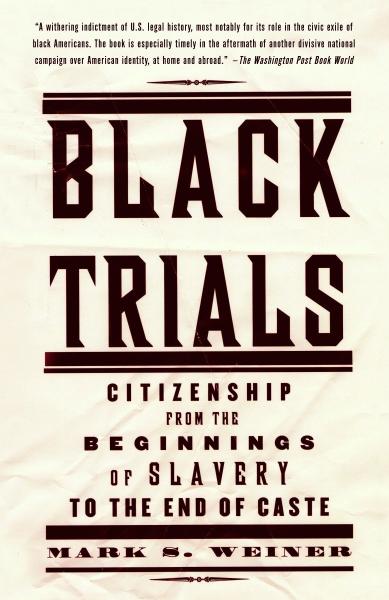Description
Introduction: Rituals of Citizenship
Part One: Colonial Visions, 1619–1773
The Birth of Black Trials
1. Let Us Make a Tryal
(Joseph Hanno and Cotton Mather, Boston, 1721)
2. This Villainous Conspiracy
(The Great Negro Plot, New York, 1741)
3. Air Too Pure
(Somerset’s Case, London, 1772)
Part Two: White Republic, 1776–1849
National Identity on Trial
4. I Should Not Turn Her Out
(Crandall v. Connecticut, Hartford, 1833)
5. All We Want Is Make Us Free
(The Amistad,Washington, 1841)
6. Christian Witness
( Jones v. Van Zandt, Cincinnati, 1847)
Part Three: New Americans, 1850–1896
Fulcrum
7. The Law of Blood
(John Brown, Virginia, 1859)
8. Original Purity
(The Ku Klux Klan Trials, South Carolina, 1871)
9. In the Nature of Things
(The Civil Rights Cases, California, 1883, and
Plessy v. Ferguson, Louisiana, 1896)
Part Four: Uplift the Race, 1903–1970
Overcoming Jim Crow
10. Black, White, and Red
(The Scottsboro Boys, Alabama, 1931)
11. Hearts and Minds
(Brown v. Board of Education, Kansas, 1954)
12. To Die for the People
(Huey Newton, California, 1968)
Part Five: After Caste, 1991–2004
Passage
13. Confirmation
(Anita Hill and Clarence Thomas, Washington, 1991)
14. Statistics and Citizenship
(Mumia Abu-Jamal, Philadelphia, 2001)
Coda
Notes
Index
From a brilliant young legal scholar comes this sweeping history of American ideas of belonging and citizenship, told through the stories of fourteen legal cases that helped to shape our nation.
Spanning three centuries, Black Trials details the legal challenges and struggles that helped define the ever-shifting identity of blacks in America. From the well-known cases of Plessy v. Ferguson and the Clarence Thomas confirmation hearings to the more obscure trial of Joseph Hanno, an eighteenth-century free black man accused of murdering his wife and bringing smallpox to Boston, Weiner recounts the essential dramas of American identity—illuminating where our conception of minority rights has come from and where it might go. Significant and enthralling, these are the cases that forced the courts and the country to reconsider what it means to be black in America, and Mark Weiner demonstrates their lasting importance for our society.
“The choices that Weiner makes . . . reveal not a little bravery of the intellectual variety . . . [He] is excellent at spinning these yarns. He creates genuine drama.”
–Justin Driver, The New Republic
“Serious, deeply felt . . . This book is the best of its kind.”
–Publishers Weekly
“A withering indictment of U.S. legal history, most notably for its role in the civic exile of black Americans. The book is especially timely in the aftermath of another divisive national campaign over American identity, at home and abroad.”-The Washington Post Book World
"Lively and enlightening….Weiner’s book rises above most scholarly efforts because of his girl for storytelling….Highly accessible and fascinating."-The American Lawyer
Product Details
- Knopf Doubleday Publishin Brand
- Jan 3, 2006 Pub Date:
- 0375708847 ISBN-10:
- 9780375708848 ISBN-13:
- 448 Pages
- 7.97 in * 5.23 in * 0.91 in Dimensions:
- 1 lb Weight:




